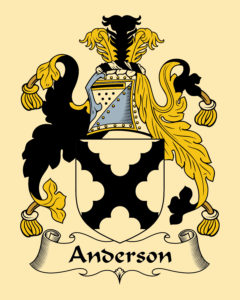
We sell our products exclusively on Amazon so you can buy with confidence knowing you are protected by Amazons no hassle return policy and our 4.9 star lifetime seller rating with over 2000 reviews. Items featuring a family crest make great gifts, whether for yourself or that hard to buy for family member, friend or co-worker.
We also sell customized license plates (add your own image and text). customizable mugs and license plates for military veterans, classic art on mouse pads and posters, a wide variety of flag license plates for nations around the world as well as pride flags and Native American tribal flags. Click here to go to our Amazon Store front.
We sell Mugs, Plaques, Prints, Ceramic Tiles, Coasters, Garden Flags, License Plates and Mouse Pads featuring The Anderson Coat of Arms. Click the image to go to Anglo/Irish names A section of our Amazon store.
Etymology
The surname “Anderson” is a patronymic name, which means it is derived from the name of a father or ancestor. Specifically, it comes from the given name “Andrew,” which itself has Greek origins, meaning “manly” or “brave.” The suffix “-son” is of Scandinavian origin, indicating “son of.” Thus, “Anderson” essentially means “son of Andrew.”
Earliest Recorded Use
In Scotland: The surname Anderson is particularly common in Scotland, where it is often associated with the Clan MacAndrew, a sept of the Clan Ross. The first recorded use of the surname in Scotland appears in the late 13th century. One of the earliest known references is to a man named “John Anderson” in the “Exchequer Rolls of Scotland” dated 1296. This period coincides with the reign of King Edward I of England, who had considerable influence over Scotland, resulting in various records being kept during his administration.
In England: The surname appears in England around the same time. One of the earliest instances is found in the “Hundred Rolls” of 1273, where a “Richard Andrewesson” is recorded. The use of surnames in England became more widespread after the Norman Conquest in 1066, but patronymic surnames like Anderson became common later, during the 13th and 14th centuries.
In Ireland: In Ireland, Anderson is an anglicized version of the Gaelic “Mac Aindriú,” which means “son of Andrew.” The name is particularly prevalent in Ulster, where many Scottish settlers arrived during the Plantation of Ulster in the early 17th century. This migration brought many Scottish surnames, including Anderson, to Ireland. The earliest records in Ireland date back to the 17th century, with the Andersons being part of the Scottish Presbyterian community that settled there.
In the United States: The surname Anderson arrived in the United States with early settlers, particularly those of Scottish and Irish descent. The name was recorded in various colonies in the 17th century. For example, a John Anderson is noted as living in Virginia in 1650. The widespread migration of Scots-Irish (Ulster Scots) in the 18th century further contributed to the prevalence of the surname in America.
Spelling Variations
The surname Anderson has several spelling variations, reflecting regional dialects, historical phonetic spelling, and anglicization processes. Some of these variations include:
Andersson: Scandinavian McAndrews: An Irish, MacAndrew: A Scottish variant, Anders: A shortened version of the name, commonly found in Scandinavian countries, Andersen: A variation common in Denmark and Norway, Andersoun: An older Scots form, Anderton, Andrewson: found in early English records, Andirson: An archaic spelling
Cultural and Historical Context
The surname Anderson is particularly associated with Scottish heritage, reflecting the historical importance of patronymic naming conventions in Scottish culture. The name Andrew was popularized by Saint Andrew, the patron saint of Scotland, which contributed to the name’s prevalence. The Scottish Clan system also played a role in the propagation of the surname, as members of the same clan often adopted similar or related names.
In Ireland, the name Anderson is linked to the history of Scottish settlement, particularly in Ulster. The Plantation of Ulster was a significant event that brought many Scottish settlers to Ireland, and with them, surnames like Anderson. The name thus carries a sense of Scottish-Irish heritage, particularly among Ulster Scots communities.
In the United States, the surname Anderson has become widespread and is not specifically tied to any single ethnic or cultural group due to the diverse origins of early American settlers. It is a common surname across the country and is associated with the broader Scottish and Irish diasporas.
Overall, the surname Anderson is a classic example of a patronymic name that has spread across different regions and cultures, evolving in spelling and form while retaining its core meaning of “son of Andrew.”